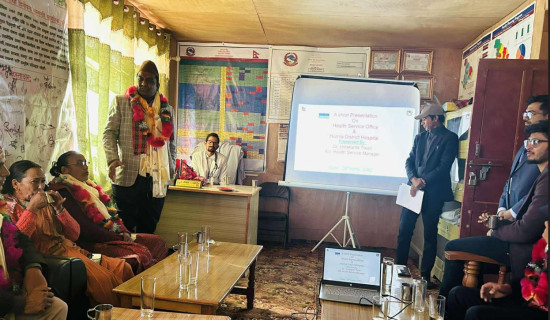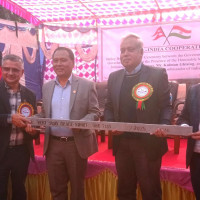- Friday, 21 November 2025
Biratnagar Milk Supply Schem in red
By Sashidhar Parajuli,Biratnagar, Nov. 21: The Biratnagar Milk Supply Scheme under the government-owned Dairy Development Corporation (DDC) is facing an acute financial crisis.
Farmers, frustrated by not receiving payment for their milk for a long time, have stopped supplying milk to the DDC project.
As farmers halt milk supply, the project’s chilling centres are closing in large numbers, increasing the risk of the entire project being collapsed.
According to Hira Bahadur Magar, acting chief of the Biratnagar project, three milk chilling centres in Ilam district alone have been shut down within a few months.
The chilling centres in Puwakhola, Phikkal and Laxmipur, which had been operating in Ilam for decades, have been completely closed.
The closure of these chilling centres has dealt a major blow to the organisation.
The Laxmipur chilling centre alone used to collect 1,400 litres of milk daily, while Puwakhola and Phikkal each collected an average of 1,000 litres per day.
Similarly, the condition of other chilling centres, including the Shantidanda milk collection centre in Ilam, is becoming critical.
Magar said the Shantidanda centre was initially closed due to road problems, and although the road has since reopened, milk collection has not resumed because farmers are no longer interested in selling milk.
Milk collection at other operational centres has also declined by one-third as farmers have stopped bringing milk.
Of the 11 milk collection centres operating under the Biratnagar project, only seven are currently functioning.
Payments stalled for 200 days, Rs. 180 million in arrears
Farmers are dissatisfied with the project after repeatedly failing to receive timely payments for the milk they supplied.
According to Magar, farmers have not been paid since April 28 of this year.
Payments have been delayed for 200 days, leaving dues of around Rs. 180 million unpaid.
“The farmers have not been able to manage their daily lives because they haven’t received the milk money—a key source of cash income—for 6–7 months,” Magar said. “That is why they seem to have been compelled to look for alternatives; we cannot say otherwise.”
Five years ago, before the COVID-19 pandemic, the project collected up to 200,000 litres of milk daily.
However, this figure has steadily declined.
Three years ago, collection stood at around 50,000 litres per day, two years ago at 40,000 litres, and last year it dropped to 20,000 litres. Now, daily milk collection has shrunk to just 13,000 litres.
Private dairy, churpi industries become farmers’ alternatives
After the DDC failed to pay on time, farmers began selling milk to private dairy industries through cooperatives.
Magar said farmers in the hilly regions have started selling milk to ghee and curd manufacturers, creating a shortage of milk for government-run projects.
On one hand, milk collection has plunged; on the other, sales of DDC dairy products in the market have also dropped sharply.
Stakeholders have expressed concern that livestock farmers are directly affected, increasing the risk of them being displaced from their occupation.














